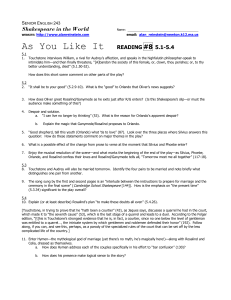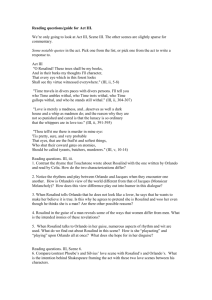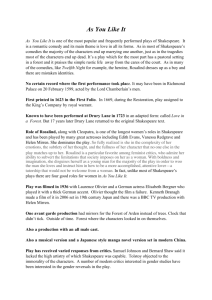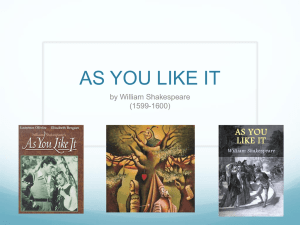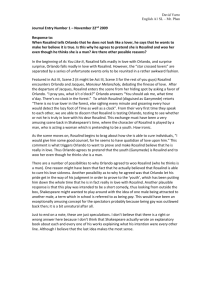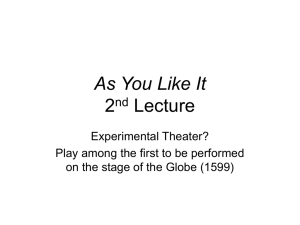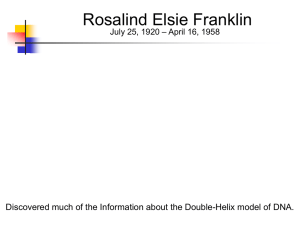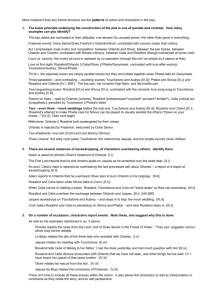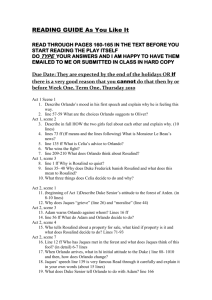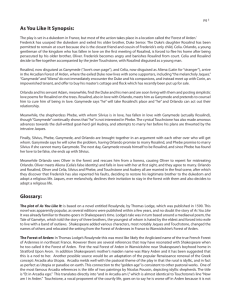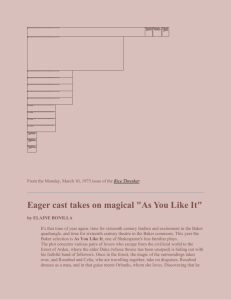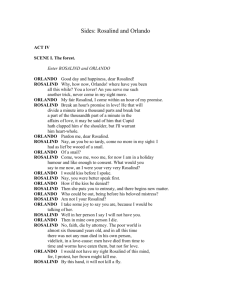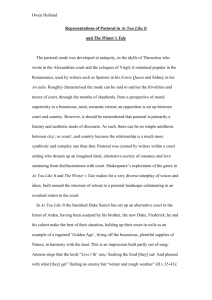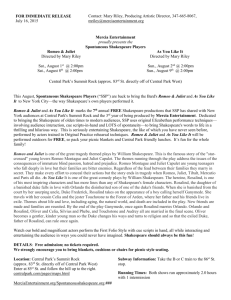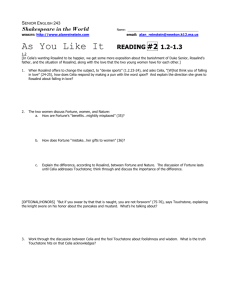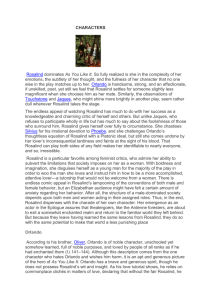As You Like It: A study guide for the SW fall production by William
advertisement
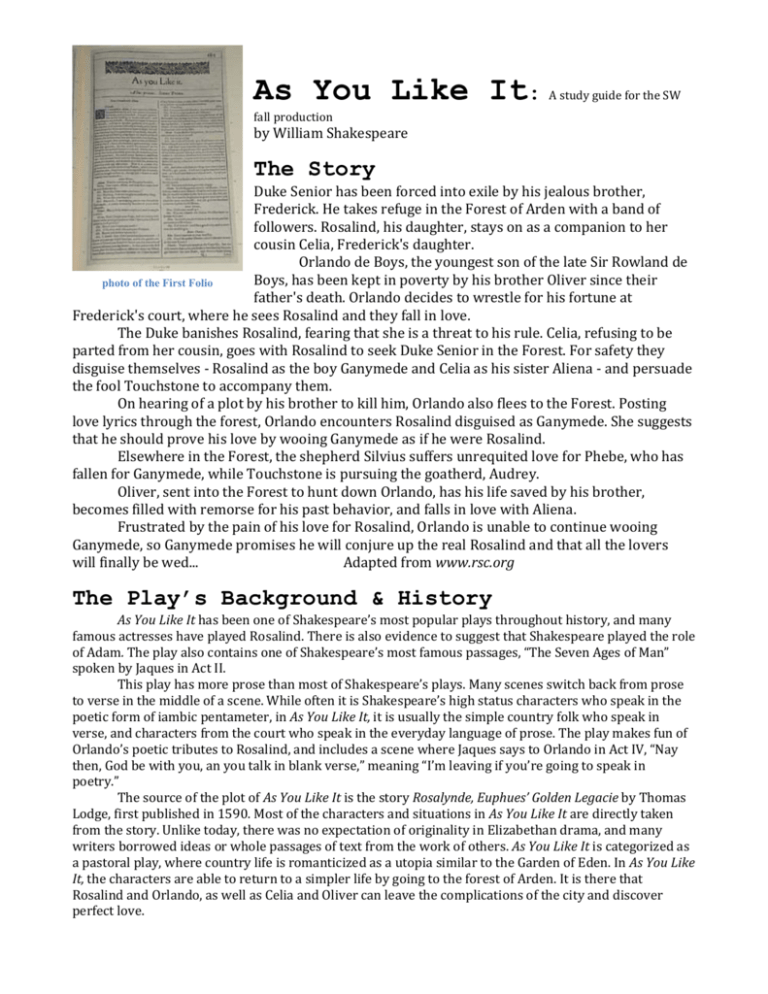
As You Like It: A study guide for the SW fall production by William Shakespeare The Story Duke Senior has been forced into exile by his jealous brother, Frederick. He takes refuge in the Forest of Arden with a band of followers. Rosalind, his daughter, stays on as a companion to her cousin Celia, Frederick's daughter. Orlando de Boys, the youngest son of the late Sir Rowland de Boys, has been kept in poverty by his brother Oliver since their photo of the First Folio father's death. Orlando decides to wrestle for his fortune at Frederick's court, where he sees Rosalind and they fall in love. The Duke banishes Rosalind, fearing that she is a threat to his rule. Celia, refusing to be parted from her cousin, goes with Rosalind to seek Duke Senior in the Forest. For safety they disguise themselves - Rosalind as the boy Ganymede and Celia as his sister Aliena - and persuade the fool Touchstone to accompany them. On hearing of a plot by his brother to kill him, Orlando also flees to the Forest. Posting love lyrics through the forest, Orlando encounters Rosalind disguised as Ganymede. She suggests that he should prove his love by wooing Ganymede as if he were Rosalind. Elsewhere in the Forest, the shepherd Silvius suffers unrequited love for Phebe, who has fallen for Ganymede, while Touchstone is pursuing the goatherd, Audrey. Oliver, sent into the Forest to hunt down Orlando, has his life saved by his brother, becomes filled with remorse for his past behavior, and falls in love with Aliena. Frustrated by the pain of his love for Rosalind, Orlando is unable to continue wooing Ganymede, so Ganymede promises he will conjure up the real Rosalind and that all the lovers will finally be wed... Adapted from www.rsc.org The Play’s Background & History As You Like It has been one of Shakespeare’s most popular plays throughout history, and many famous actresses have played Rosalind. There is also evidence to suggest that Shakespeare played the role of Adam. The play also contains one of Shakespeare’s most famous passages, “The Seven Ages of Man” spoken by Jaques in Act II. This play has more prose than most of Shakespeare’s plays. Many scenes switch back from prose to verse in the middle of a scene. While often it is Shakespeare’s high status characters who speak in the poetic form of iambic pentameter, in As You Like It, it is usually the simple country folk who speak in verse, and characters from the court who speak in the everyday language of prose. The play makes fun of Orlando’s poetic tributes to Rosalind, and includes a scene where Jaques says to Orlando in Act IV, “Nay then, God be with you, an you talk in blank verse,” meaning “I’m leaving if you’re going to speak in poetry.” The source of the plot of As You Like It is the story Rosalynde, Euphues’ Golden Legacie by Thomas Lodge, first published in 1590. Most of the characters and situations in As You Like It are directly taken from the story. Unlike today, there was no expectation of originality in Elizabethan drama, and many writers borrowed ideas or whole passages of text from the work of others. As You Like It is categorized as a pastoral play, where country life is romanticized as a utopia similar to the Garden of Eden. In As You Like It, the characters are able to return to a simpler life by going to the forest of Arden. It is there that Rosalind and Orlando, as well as Celia and Oliver can leave the complications of the city and discover perfect love. 1599, the year of its production, marked an amazingly productive time in William Shakespeare’s career. During this year or just before it, he probably wrote Much Ado About Nothing, Henry V, Julius Caesar, Hamlet, and As You Like It. The comedies of Much Ado and As You Like It have strong women characters, and as Elizabethan actors were only men, this indicates that the company had at least two young actors whose strength was in playing women. These two plays also marked a very different style of comedy. Previously, the company’s lead comedian was William Kempe, whose specialty was physical, full of falls and comic dancing. In early 1599 he quit and was replaced by Robert Armin. Armin’s had a much more William Kemp intellectual performance style, emphasizing work play and singing. Robert Armin would have likely played Dogberry in Much Ado and Touchstone in As You Like It. The change in style affected Shakespeare’s writing and led to comedies with more verbal humor. In 1598, Shakespeare’s company, The Lord Chamberlain’s Men (named after their patron who supported them financially), had lost the lease to the property where they performed. The theatre building, which had the name “The Theatre,” was built and owned by the company, but the landowner decided he should have ownership of the building after the lease on the land expired. To avoid a legal battle, the company disassembled the entire structure during the landlord’s Christmas holiday in the country. In the spring they reassembled the theater across the river in the neighborhood of Bankside, where they could also avoid London’s taxes and restrictive laws. While there is no definitive evidence for which play was the first to open the new theatre, most Shakespeare scholars believe that the first production was As You Like It or Julius Caesar. "Rosalind" by Robert Walker Today, As You Like It is one of Shakespeare’s most popular plays. It has Macbeth many current productions, and many adaptations and interpretations in art, http://en.wikipedia.org/wiki/File:Rosalind__Robert_Walker_Macbeth.jpg radio, film, and television, as well as the stage. Discussion and Journal Questions 1. What different kinds of love are portrayed in As You Like It? Does the play seem to favor any particular kind of love as being better or longer lasting? 2. Compare and contrast the following characters’ views of love: Orlando, Rosalind, Silvius, Phebe and Touchstone. Which character most closely represents your own attitude toward love? 3. Why do you think Jaques enjoys being melancholy? Why does he admire Touchstone, the fool? 4. Rosalind gets dressed as a boy to protect herself and to teach Orlando about women. What does this play say about gender roles? Is there still any truth to these expectations today? 5. As You Like It is full of people pretending to be someone else for different reasons. Jaques also compares living to acting out a role in a play. What are the advantages and disadvantages of playing these roles to the characters in the play? Is it the same in our own lives? 6. How do the costumes, lighting, set, and sound complement the story and message of the play? Sources Consulted "As You Like It." History of the Play. Royal Shakespeare Company, n.d. Web. 10 Nov. 2013. “As You Like It.” “Robert Armin.” “Thomas Lodge.” “William Kempe.” Wikipedia. Wikimedia Foundation. Web. 10 Nov. 2013 “Rosalynde, or Euphues’ Golden Legacy.” LibriVox. N.p., n.d. Web. 10 Nov. 2013. Shapiro, James. A Year in the Life of Shakespeare: 1599. New York: Harper Collins, 2005.
